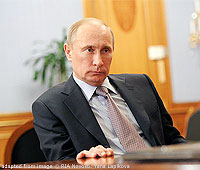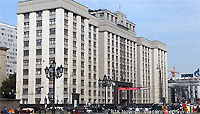Putin's Counter-Reform Props up His Dysfunctional Regime by Amplifying Uncertainty
Pavel K. Baev - Eurasia Daily Monitor, Vol. 9 Issue 134 - Jamestown Foundation - www.jamestown.org - 7.16.12 - JRL 2012-129
The main news in Russia last week was the tragedy of the flash flood in Krymsk, much the same way as a year ago it was the sinking of the cruise ship "Bulgaria." Two years ago, devastating wildfires in central Russia dominated the summer news cycle. And three years ago, it was the collapse of the Sayano-Shushenskaya hydropower station. More than any of the previous summer disasters, the devastation in Krymsk has proven the weakness of the Russian state, which is dominated by bureaucracy and infected by corruption (Nezavisimaya Gazeta, July 11). Bloggers have provided the most convincing explanation for the seven-meter-high flash flooding, which hit the Northwest Caucasus, while the authorities were busy explaining away their helplessness; and volunteers have provided the most effective support for the victims, while official promises of compensation have been slow to materialize (BestToday, Gazeta.ru, July 12). The collective mistrust in the authorities, which was revealed rather than caused by this tragedy, is so profound that it is hard to rationalize the readiness of the deeply discontented residents of Krasnodar Krai to vote for President Vladimir Putin and go along with the rotten regional administration (Moskovskie Novosti, July 13).

Putin was not able to perform one of his favorite PR tricks "manual management" of this disaster and did not even make a scapegoat out of the notorious Krasnodar Krai governor Aleksandr Tkachev, who is a big shareholder in the Sochi construction projects crucial for the 2014 Winter Olympics and has many influential friends in Moscow (Novaya Gazeta, July 13). Putin's prime concern is preventing the "white opposition" from gaining extra support due to the Krymsk tragedy, so his efforts are focused on discrediting its leaders and activities by investigating the "riots" of June 6, publishing the private correspondence of increasingly popular Aleksei Navalny, and keeping behind bars the young women from the punk group Pussy Riot (Nezavisimaya Gazeta, July 13). Particular emphasis in these efforts is placed on the package of new legislation rushed through the State Duma in a matter of a few weeks that regulates every avenue of opposition offensive, from street rallies to freedom of expression, and from censoring the Internet to compromising the NGOs receiving Western grants (Vedomosti, July 13).
Each of these laws is justified by references to European and US legislation, such as the Foreign Agents Registration Act (FARA), which is grossly misleading; and the space for abuse is wide open in Russian courts where judicial independence remains a foreign concept (Polit.ru, July 14). Taken together, they signify a reversal of Medvedev's feeble attempts at political liberalization and a fallback to the vintage Putinism based on monopolization of power. It is doubtful that Putin is familiar with Alexis de Tocqueville's warning that the most dangerous moment for a bad government is when it begins to reform; but nonetheless, the President's political instinct recognizes a cause for alarm (Moscow Echo, July 13). It matters little that experts theorize economic reforms can only progress if the political sphere opens up for more competition; for Putin, political control comes first, and he tends to believe that nothing is wrong with the model of bureaucratic capitalism where huge state corporations are run by his loyalists and cronies. His counter-reforms, however, are irresolute and sluggish.
Putin is not really keen to unleash repressions, knowing that a large part of the bureaucratic elite worried about its fortunes safely deposited in the West and scared by the progress of the "Magnitsky bill" in the US Congress could defect from him (PBC Daily, July 13). The strategy he excels at is building up uncertainty so that every potential "white ribbon" would know there is no safety in the numbers that the street protests have achieved so far. At the same time, the Putin regime dispenses no brutal suppression or collective punishment that could enrage many among the discontented, thus swelling the rallies. Uncertainty is also used for disciplining the elites. Some regional clans, for instance in Kabardino-Balkaria, are prosecuted for corruption, and some "power structures," for instance the top level of the Interior Ministry, are thoroughly reshuffled, while the majority of bureaucrats feels reasonably safe (Lenta.ru, July 14; Moskovskie Novosti, June 18).
In order to bolster the domestic role of the master of uncertainty, Putin seeks to reassert his international credentials, but has unexpectedly encountered a chain of setbacks and fiascos. His first visit to Europe was embarrassingly disagreeable; the restoration of amicability with Belarusian President Alyaksandr Lukashenka has tainted him by association with the ostracized dictator; and soon after his friendly visit to Tashkent, President Islam Karimov shrewdly suspended Uzbekistan's participation in the Collective Security Treaty Organization (Nezavisimaya Gazeta, July 4). Russia's contrarian position on the civil war in Syria, instead of boosting its profile in the Middle East, has made Putin look scared of the specter of revolution (Gazeta.ru, July 12). Moscow currently has a rare position of strength vis-à-vis Ukraine, where economic and political crises come together while the EU has turned its back on Kiev's plight. But the long-expected meeting between Putin and President Viktor Yanukovich last week was a major disappointment. It lasted barely 20 minutes, and Putin's rendezvous with a group of bikers on the way to the Livadia palace received more coverage than his lukewarm consent to delimit the maritime border in the Kerch Strait (Kommersant, July 13).
These foreign policy setbacks reflect the fact that degrading Putin's domestic standing is narrowing the limits of his overall power and authority (Vedomosti, July 11). The bureaucracy does not appreciate his use of uncertainty to manipulate the domestic situation and would rather prefer him as the figurehead who secures popular support. In order to cut a convincing figure, however, Putin needs to score a clear victory over the opposition and not merely facilitate its dissolution. Moscow is set to see a decisive confrontation in the autumn as the opposition gathers its forces in order to defy the selective "tightening of screws." Meanwhile the elites, who are heavily concentrated in the capital, will evaluate the effectiveness of Putin's counter-reforms and contemplate their other choices besides following the dull drum of a dictatorship on the defensive. "Back to basics" is not a solution for Putin's Moscow problem, and the hard-driven, dynamic megalopolis is beginning to see no future with him.
Keywords: Russia, Government, Politics - Russia, Media, Internet - Russia, Nonprofits, NGO's, Activists - Russian News - Russia - Johnson's Russia List
Before finishing its summer session last week, the State Duma passed three laws that experts believe are meant to curb criticism of government in Russia. And it has been announced that the autumn session in parliament will be started with a fourth bill in the same vein.

Last Wednesday, lawmakers sanctioned the blocking of websites featuring content that "could threaten children's lives, health and development." Online outlets such as Yandex, LiveJournal, Google Russia and Wikipedia protested the new law, claiming it was passed in order to censor the Internet.
On Friday, lawmakers passed a bill obliging non-profits that receive funding from abroad to declare themselves "foreign agents" (a Soviet-era tag which meant "spy") and to submit accounting reports twice more often than before.
On the same day, slander was officially criminalized in Russia once more after having been decriminalized on the initiative of then-President Dmitry Medvedev just last year and fines for it increased up to 5 million rubles ($153,000). A recommendation by President Vladimir Putin, who stated that slander should not carry a prison term, was heeded by the lawmakers.
In September, the ruling United Russia party will also propose a bill to increase fines for insults at least tenfold, Pavel Krasheninnikov, the head of the Duma's Committee on Arbitrage, Civil, Criminal and Procedural Legislation, told Nezavisimaya Gazeta last Friday.
Krasheninnikov raised doubts about the decriminalization efforts made by Medvedev, who currently serves as United Russia's chairman in addition to being Prime Minister.
"Since articles on slander and insults were taken out from the criminal code, people no longer seek justice in court," Krasheninnikov said. "They don't believe that fines of 1,000 to 3,000 rubles are severe enough punishment for someone who has insulted them."
Right now fines for insults range between 1,000 rubles ($31) to 5,000 ($153) for individuals, and from 30,000 rubles ($920) to 500,000 rubles ($15,300) for organizations while only an individual can be a complainant in an insult trial.
Communist Vadim Solovyov, the deputy head of the Duma's Committee on Constitutional Legislation, told The Moscow News that the proposed draft suggests expanding the notion of complainant so that it will include organizations.
This can allow United Russia to sue opposition leader Alexei Navalny for coining the "party of crooks and thieves" label, which has become popular shorthand for the party. "If United Russia members consider themselves insulted by the 'party of crooks and thieves' tag, they'll be able to have Navalny prosecuted," Solovyov said.
Andrei Tarasov, vice partner at the Moscow-based Reznik, Gagarin & Partners law firm, told The Moscow News that in this case United Russia would need to prove how this statement affected the party's reputation.
"They could argue that the party's ratings dropped following his statement and, say, in the Vologda Region it polled 5 percent, while before it its ratings stood at 10 percent," Tarasov said. "Navalny's lawyers would need to prove that the ratings fell due to economic reasons, to give an example."
So far, Navalny has been challenged to a duel by one United Russia member from Volgograd, Andrei Popkov, whom Navalny called a "United Russia hog" in one of his posts on LiveJournal.
In April, Popkov traveled to Italy along with 45 other Volgograd officials on what they argued was a business trip to study how Italian hog farms operate, among other things. Later Popkov admitted to a local TV station that they went to Italy on vacation. Should the insults article be returned to Russia's criminal code, Popkov will be able to hold Navalny liable in a criminal trial.
Unconstitutional?
Mikhail Fedotov, the head of the Presidential Council on Human Rights, told The Moscow News that there is no need to make insults and slander criminal offenses again. Fedotov expects the Constitutional Court to revise this legislation following appeals from citizens to be charged with insults and slander.
Vadim Solovyov of the Communist Party said that his party will incur significant losses if it ever needs to pay a 5 million ruble fine.
The toughening of the legislation on insults and slander could take its toll on the Russian media. Around 40 journalists used to be convicted of slander and insults annually.
Last July, a journalist of the Listok newspaper in Gorno-Altaisk, Sergei Mikhailov, was fined 200,000 rubles ($6,100) for saying that the Altai Governor, Alexander Berdnikov, is an "alcoholic" in one of his articles.
Solovyov believes that the new legislation will make it possible to qualify any criticism of authorities as an insult. "The bill's wording is very vague, it's unclear who it will be applied to," he said.
The biggest problem, according to Solovyov, is that Russian courts make arbitrary decisions and the prosecuting side often orders expert evaluations of so-called offensive statements that will invariably draw the "right" conclusions for the benefit of the trial.
Solovyov, who is the head of the Communist Party's legal service, once had to defend the party's Tver branch in court on charges of extremism for a leaflet that said: "Down with [Governor] Zelenin." A local linguist submitted two contradictory reports. The first report said that the slogan wasn't extremist, but the second one said that it was.